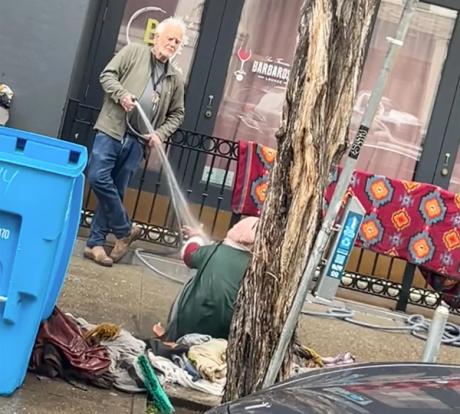
The San Francisco gallery owner who was arrested earlier this year after a video of him spraying a homeless woman with a garden hose went viral has agreed to volunteer hours to avoid jail time.
In January, the San Francisco Police Department opened an investigation after Collier Gwin, owner of Foster Gwin (a gallery in the city’s Jackson Square neighborhood), was filmed spraying a woman sitting on the sidewalk at outside the gallery. San Francisco District Attorney Brooke Jenkins called the attack “completely unacceptable”. Gwin was charged with misdemeanor battery and faced up to six years in prison.
In a deal with the San Francisco District Attorney’s Office announced Monday, July 10, Gwin will volunteer 35 hours at Third Baptist Church, the oldest African-American church in San Francisco. The charges against Gwin will be dismissed once he completes the hours, Gwin’s layer said.
After the video went viral, the Foster Gwin Gallery was vandalized and its windows smashed. Gwin initially defended his actions, saying he and his neighbors had previously reported concerns about the woman, who he said suffered from mental illness.
“I find it hard to apologize when we haven’t received any help with the situation,” he told the local news station. ABC7 before his arrest. According to a statement from Gwin’s attorney, the woman was known in the neighborhood to be disruptive and seriously ill. The woman refused to press charges, refused municipal services and a few days later was placed in involuntary psychiatric detention.
Gwin later apologized in a video statement and asked viewers to “try to better understand my breaking point by looking at the sudden reactions they might have had in their own lives and how strongly they may have reacted. excessively and now feel so humbled and sorry,” Gwin said.
In a statement Monday, Gwin said the city of San Francisco should also be held accountable.
“Ordinary citizens are not equipped to deal with these kinds of problems. At the very least, the city should provide safe and clean streets and sidewalks in exchange for our tax money. It’s a minimum duty,” Gwin said.
San Francisco has faced decades of housing shortages and rising costs of living that have exacerbated homelessness, which has only worsened since the start of the Covid-19 pandemic. About 7,800 San Francisco citizens are homeless, according to city figures from 2022.
